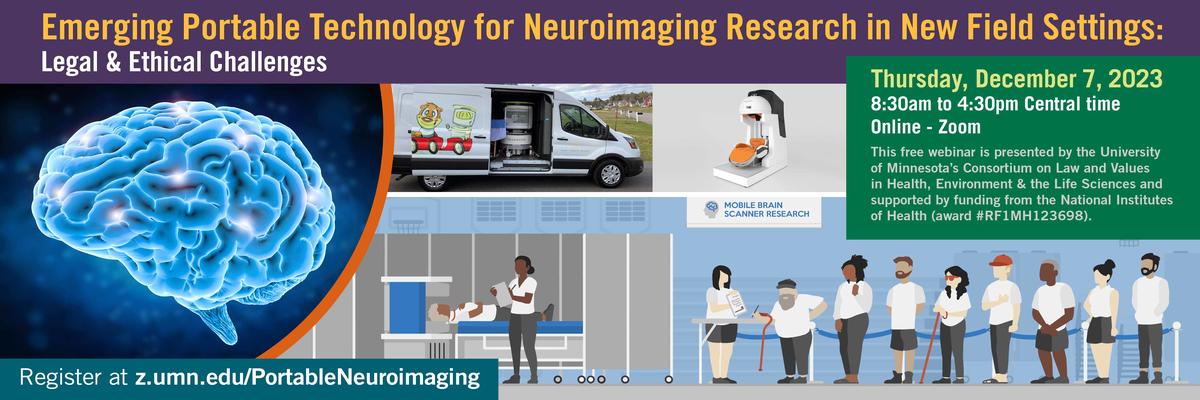
Emerging Portable Technology for Neuroimaging Research in New Field Settings: Legal & Ethical Challenges
Emerging highly portable MRI technology is revolutionizing neuroscience research. Instead of participants traveling to the scanner, the scanner will come to them. In this conference, top multidisciplinary experts will explore the urgent ethical and legal issues raised by portable MRI. Presentations included recommendations developed in an NIH BRAIN Initiative grant on how to navigate key ethical and legal issues; as well as explorations of access issues, equity, privacy, data control, the role of the IRB, safety, and artificial intelligence. The conference highlighted the importance of community engagement and concerns raised by research in special populations including children and those with dementia.
This conference is supported in part by the NIH BRAIN Initiative Grant Highly Portable and Cloud-Enabled Neuroimaging Research: Confronting Ethics Challenges in Field Research with New Populations (RF1MH123698).
Image of Scan-A-Van (top, left) is used with permission from Sean C.L. Deoni. Image of Portable 1.5 Tesla MRI system technology (top, middle) is used with permission from Mailin Lemke and Ben Parkinson. Illustration of how a portable MRI system might be deployed for field-based research in a school gymnasium was created for this project by Alexis Kocken (2021).
Conference Agenda
Emerging Portable Technology for Neuroimaging Research in New Field Settings: Legal & Ethical Challenges
| 8:30am | Welcome & Introduction |
| Moderator: Susan M. Wolf, JD, Regents Professor and McKnight Presidential Professor of Law, Medicine & Public Policy; Faegre Baker Daniels Professor of Law; Professor of Medicine, University of Minnesota | |
| 8:45am | Video Demonstration of Portable MRI Research in the Field |
Moderator: Francis X. Shen, JD, PhD, Faculty Member, Harvard Medical School Center for Bioethics & MGH Department of Psychiatry; Harvard University Affiliated Professor, Harvard Law School; Chief Innovation Officer, MGH Center for Law, Brain & Behavior
| |
| 9:00am | Portable MRI Research: Applications and Opportunities |
Moderator: Donnella S. Comeau, MD, PhD, Instructor in Radiology, Harvard Medical School; Neuroradiology Attending, Beth Israel Deaconess Medical Center; IRB Vice Chair, Mass General Brigham Highly Portable MRI Research: Lessons From the Field
Decolonizing MRI Research
| |
| 10:00am | Break |
| 10:15am | Ethical, Legal, and Policy Challenges in Field-Based Neuroimaging Research Using Emerging Portable MRI Technologies: Guidance for Investigators and for Oversight |
Moderator: Paul Tuite, MD, Professor, Department of Neurology, University of Minnesota
| |
| 11:45am | Lunch Break |
| 12:15pm | Panel #1 – The Future of Portable MRI in Research: Challenges and Opportunities |
Moderator: S. Duke Han, PhD, Professor of Family Medicine, Neurology, Psychology, and Gerontology, Keck School of Medicine, University of Southern California Public and Key Expert Stakeholder Perspectives on the Ethical, Legal, and Societal Implications of Emerging Technology for Highly Portable and Accessible MRI
Portable MRI and Population Research with Children
Portable MRI and Research with Low-SES Participants
Dementia Research and Portable MRI
| |
| 1:30pm | Panel #2 – Community Engagement and Data Control in Portable MRI Research |
Moderator: Kafui Dzirasa, MD, PhD, A. Eugene and Marie Washington Presidential Distinguished Professor, Professor of Psychiatry and Behavioral Sciences, Duke University Using Portable MRI to Address Health Disparities Research with Indigenous Peoples
Centering Community Voices in Highly Portable MRI Research: Critical Perspectives and Points of Departure
Research Participant Data Access and Data Control: Approaches and Controversies
Community Engagement in Neuroscience Research: Lessons from the Nation’s First African Ancestry Neuroscience Research Initiative
| |
| 2:45pm | Break |
| 3:00pm | Panel #3 - Oversight of Portable MRI Research |
Moderator: Efrain Torres, PhD, CEO & Co-Founder, Adialante The Need for Safety and Ethics Oversight of Portable MRI
Artificial Intelligence and Portable MRI Research: The Oversight Challenge
Role of Institutional Review Boards in Ensuring Ethical Oversight of Neuroimaging Research Using Emerging, Highly Portable MRI
Next Steps in Ethics and Oversight
| |
| 4:15pm | Closing Remarks |
| |
| 4:30pm | Adjourn |
Speaker Biographies
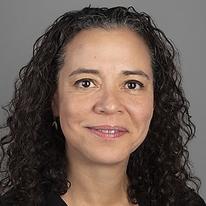
Donnella S. Comeau, MD, PhD, is an Instructor in Radiology, Harvard Medical School, Neuroradiology Attending, Beth Israel Deaconess Medical Center, and IRB Vice Chair, Mass General Brigham. A neuroradiologist with a PhD in neurobiology from Harvard Medical School, Dr. Comeau has collaborated on the development of several Mass General Brigham medical machine learning algorithms, and has academic expertise in health equity, bioethics, and medical artificial intelligence. Her clinical specialties include Diagnostic Radiology and Neuroradiology, and she has Board Certifications from the American Board of Radiology in Diagnostic Radiology and Neuroradiology. She graduated from Harvard Medical School and completed a residency at Brigham and Women's Hospital.

Sean C. L. Deoni, PhD, is Senior Program Officer, Bill & Melinda Gates Foundation, Maternal, Newborn, & Child Health Discovery Tools, Director of MRI Research at the Department of Pediatrics at Memorial Hospital of Rhode Island, and an Adjunct Professor of Engineering, School of Engineering at Brown University. His lab's work focuses on developing and applying magnetic resonance imaging (MRI) techniques to study early brain development. Current studies include following the process of myelination in healthy infants and toddlers in relationship to behavioral development and exploring the varied environmental and genetic influences that shape these brain-behavior relationships.

Kafui Dzirasa, MD, PhD, is A. Eugene and Marie Washington Presidential Distinguished Professor, Professor of Psychiatry and Behavioral Sciences, Duke University. He is the first African American to complete a PhD in Neurobiology at Duke University. His research interests focus on understanding how changes in the brain produce neurological and mental illness. Dr. Dzirasa obtained an MD from the Duke University School of Medicine in 2009 and completed residency training in General Psychiatry in 2016. He has served on the Editorial Advisory Board for TEDMED and currently serves on the Advisory Committee for the National Institutes of Health (NIH) Director. Kafui is a member of the National Academy of Medicine and is a Howard Hughes Medical Institute (HHMI) Investigator.

Barbara Evans, JD, PhD, LLM, is Professor of Law and Stephen C. O’Connell Chair at the University of Florida Levin College of Law and Professor of Engineering at the University of Florida Wertheim College of Engineering. Her current research interests include FDA regulation of machine-learning clinical and patient decision support software and gene sequencing and editing technologies, health data privacy and access, genomic civil rights, and citizen science and citizen-led bioethics standard-setting.

Damien Fair, PA-C, PhD, is Redleaf Endowed Director, Masonic Institute for the Developing Brain, Professor, Institute of Child Development, College of Education & Human Development, and Professor, Department of Pediatrics, Medical School, University of Minnesota. His laboratory focuses on mechanisms and principles that underlie the developing brain. The majority of this work uses functional MRI and resting state functional connectivity MRI to assess typical and atypical populations. A second focus has become testing the feasibility of using various functional and structural MRI techniques in translational studies of developmental neuropsychiatric disorders (e.g., attention deficit hyperactivity disorder and autism). He is exploring ways to better characterize individual patients with these psychopathologies to help guide future diagnostic, therapeutic and genetic studies.

Martha J. Farah, PhD, is the Walter H. Annenberg Professor of Natural Sciences at the University of Pennsylvania, where she directs the Center for Neuroscience and Society. Farah’s research focuses on several issues at the interface of neuroscience and society, including the ethical, legal and social impact of neuroscience, or neuroethics, the ways in which neuroscience is changing the way we think of ourselves as physical, mental, moral, and spiritual beings, the expanding use of neuropsychiatric medications by healthy people for brain enhancement, and the effects of childhood poverty on brain development. Farah has received widespread recognition for her work including a Guggenheim Fellowship, the National Academy of Science’s Troland Research Award and the Association for Psychological Science’s lifetime achievement award as well as her American Academy of Arts and Sciences membership. She is also a fellow of the Cognitive Science Society, the Society of Experimental Psychologists, the Association for Psychological Science, and the American Association for the Advancement of Science.

Michael Garwood, PhD, is Malcolm B. Hanson Professor of Radiology, Department of Radiology, Center for Magnetic Resonance Research, University of Minnesota. He is the principal investigator on a recently awarded $10,800,000 NIH grant that will lead the pursuit of a next generation neuroimaging platform based on magnetic resonance imaging (MRI). This first-of-its-kind MRI system will provide new frontiers for human brain research, particularly in terms of better understanding human behavior and motor coordination.

S. Duke Han, PhD, is a Diplomate of the American Board of Professional Psychology in Clinical Neuropsychology, a Fellow of the American Psychological Association and the National Academy of Neuropsychology, Director of the Neuropsychology Division in Family Medicine, and a tenured Professor of Family Medicine, Neurology, Psychology, and Gerontology at the Keck School of Medicine of the University of Southern California. He received his Bachelor of Science degree in Psychology with a specialization in Neuroscience from Duke University, and his PhD Doctorate Degree in Clinical Psychology from the University of Massachusetts Boston. He received training in clinical neuropsychology and experimental neuroimaging techniques through various programs of Harvard Medical School's Brigham and Women's Hospital.
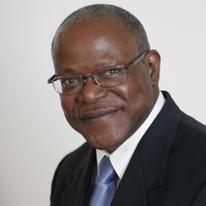
Rev. Alvin C. Hathaway, Sr., PhD, DMin is on the Leadership Core of the African Ancestry Neuroscience Research Initiative. Inducted into the Martin Luther King, Jr. Board of Preachers at Morehouse College, Dr. Hathaway has developed a national reputation in faith based community economic development, through his creation of Community Development Entities he has participated in funding over $3 Billion in redevelopment projects in urban markets throughout America. As Co-Chairperson of the $5M 5 Year PCORI Study on Middle School Mental Health Interventions and as Co-Chairperson of the $30M 5 Year Promise Neighborhood Implementation Grant, he is an expert on the intersection between faith, research, and mental health.

Judy Illes, PhD, is Professor of Neurology at the University of British Columbia (UBC), UBC Distinguished University Scholar, and Director of Neuroethics Canada. Dr. Illes is a pioneer in the field of neuroethics. Her research, teaching, and outreach initiatives are devoted to ethical, legal, social, and policy challenges at the intersection of the brain sciences and biomedical ethics. She has made groundbreaking contributions to neuroethical thinking for neuroscience discovery and clinical translation across the life span. Dr. Illes was awarded the Order of Canada, the country’s highest recognition of its citizens, in 2017.

Jonathan Jackson, PhD, is the Executive Director of the Community Access, Recruitment, and Engagement (CARE) Research Center at Massachusetts General Hospital and Harvard Medical School. CARE investigates the impact of diversity and inclusion on the quality of research with human participants. Dr. Jackson's research focuses primarily on midlife and late-life health disparities that affect underserved populations. He has become a well-known representative to underrepresented communities in clinical research and affiliated organizations. Dr. Jackson also works as a cognitive neuroscientist and is currently investigating early detection of Alzheimer’s disease.

Eran Klein, MD, PhD, is a neurologist specializing in dementia at Oregon Health and Sciences University (OHSU) and the Portland VA Medical Center. He co-leads the Neuroethics Research Group within the Center for Neurotechnology (CNT) at the University of Washington. His work focuses on ethical issues related to neurotechnology, such as effects on human agency, relationality, and privacy, as well as ethical and philosophical implications of dementia.

Frances Lawrenz, PhD, (Project Co-PI), is Professor Emeritus in the Department of Educational Psychology at the University of Minnesota. Her research focuses on science and mathematics program evaluation, utilizing a variety of techniques and usually involving mixed methodologies. She has been recognized by the American Educational Research Association and the National Association for Research in Science Teaching.
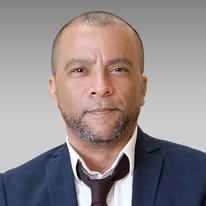
Carlos Peña, PhD, MS, is Chief Regulatory Officer and Chief Quality Officer, leading the newly-established Office of Regulatory Services at the Jacobs Institute. Prior to the JI, Carlos served as the Director of the Office of Neurological and Physical Medicine Devices, at the Center for Devices and Radiological Health (CDRH), at the U.S. Food and Drug Administration (FDA), based in the Washington, DC area. He was responsible for providing leadership in the development of safe and effective neurological and physical medicine devices to support FDA’s mission. Carlos provided oversight over several cross-functional teams and was the lead contact for the agency’s strategic plans and implementation efforts for neuro devices. He holds a PhD in Neuroscience from Case Western Reserve University and a Masters degree in Comparative Physiology from the University of Connecticut.

Khara M. Ramos, PhD, is the Vice President of Neuroscience & Society at the Dana Foundation. A neuroscientist with extensive scientific management and communications expertise, Dr. Ramos oversees the Foundation’s strategy and programs in that area. Before joining the Dana Foundation, Ramos was the inaugural director of the neuroethics program and led the neuroscience content and strategy branch in the communications office at the National Institute of Neurological Disorders and Stroke (NINDS) at the National Institutes of Health (NIH). Ramos was instrumental in establishing the rapid growth of neuroethics efforts for the NIH BRAIN Initiative, positioning NIH as a global leader in the emerging field of neuroethics.

Angie Mejia, PhD, is the Assistant Director of the Community Engagement and Education (CEEd) Core at the Masonic Institute for the Developing Brain located at the University of Minnesota. She has a PhD in sociology, specializing in mental health disparities, and extensive training in qualitative and community-based participatory research (CBPR) methods, all under the mentorship of nationally-recognized sociologists and health disparities scholars. This academic training is strengthened by over 20 years of accumulated experience as a child of civil rights activists as well as past work as a health promoter, community advocate, and community-engaged professional. This experience as a scholar and academic has put her on the path of becoming a subject matter expert in using community-engaged methods that incorporate the voice, perspective, and funds of knowledge from marginalized individuals, groups, and communities.

Matthew S. Rosen, PhD, is a physicist, tool-builder, and inventor whose research bridges the spectrum from fundamental physics to applied bioimaging work in the field of MRI. He established the Low-Field MRI and Hyperpolarized Media Laboratory at the Athinoula A. Martinos Center for Biomedical Imaging to focus on the continued development of new hyperpolarization methods and MRI-based tools. The Rosen Lab focuses on new methods and tools to enable unconventional approaches to MRI scanner construction. This includes the development of new acquisition strategies for robust ultra-low magnetic field implementations of MRI focused on brain imaging.

Francis X. Shen, JD, PhD, (Project Co-PI), is a Member of the Faculty of Global Health and Social Medicine in the Center for Bioethics at Harvard Medical School, and a Harvard University Affiliated Professor at Harvard Law School. Previously Dr. Shen was a Professor of Law, McKnight Presidential Fellow, and faculty member in the Graduate Program in Neuroscience at the University of Minnesota. He is also the past Executive Director and current Chief Innovation Officer of the Center for Law, Brain & Behavior (CLBB) at MGH. He directs the Shen Neurolaw Lab, whose motto is: “Every story is a brain story.”
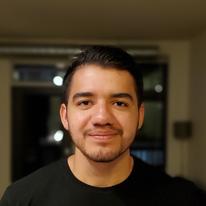
Efraín Torres, PhD, is a first-generation American and college graduate. He received his B.S. in Bioelectrical Engineering, minoring in Biophysics and Engineering Leadership from Marquette University. As a PhD student in the Department of Biomedical Engineering at the University of Minnesota, he recently received the Student Entrepreneur of the Year award from the Gary S. Holmes Center for Entrepreneurship at the University of Minnesota. He is the Co-Founder and CEO of Adialante, a start-up focusing on developing affordable and clinically valuable MRI technology.

Paul Tuite, MD, is a Professor in the Department of Neurology at the University of Minnesota Medical School, and a neurologist who treats adult patients with Parkinson’s disease (PD) and other movement disorders. Since arriving at the University of Minnesota in 1996, Dr. Tuite has directed more than 30 clinical trials related to PD and other movement disorders. In addition to evaluating new therapies, his interests include the development of novel brain MRI and nuclear imaging tests that may aid in the diagnosis of PD, increase understanding of the disease, and monitor the effects of treatment. Dr. Tuite is also interested in rehabilitation and in developing methods to monitor and improve movements in people with PD.

J. Thomas Vaughan, PhD, is both a Principal Investigator at the Mortimer B. Zuckerman Mind Brain Behavior Institute and a Professor of Biomedical Engineering at the School of Engineering, as well as a Professor of Radiology at Columbia University Medical Center. A pioneer in the field with 45 patents to his name, Vaughan designs and builds the MRI systems that produce high-resolution images of anatomical, metabolic and physiological systems and functions. His inventions, usually licensed by the biotech and medical industries, are found in most MRI systems.

Susan M. Wolf, JD, (Project Co-PI), is a Regents Professor; McKnight Presidential Professor of Law, Medicine & Public Policy; Faegre Baker Daniels Professor of Law; and Professor of Medicine at the University of Minnesota. She is Chair of the University’s Consortium on Law and Values in Health, Environment & the Life Sciences. She is an elected member of the National Academy of Medicine (NAM) and a Fellow of the American Association for the Advancement of Science (AAAS).
Project Working Group

Donnella S. Comeau, MD, PhD, is an Instructor in Radiology, Harvard Medical School, Neuroradiology Attending, Beth Israel Deaconess Medical Center, and IRB Vice Chair, Mass General Brigham. A neuroradiologist with a PhD in neurobiology from Harvard Medical School, Dr. Comeau has collaborated on the development of several Mass General Brigham medical machine learning algorithms, and has academic expertise in health equity, bioethics, and medical artificial intelligence. Her clinical specialties include Diagnostic Radiology and Neuroradiology, and she has Board Certifications from the American Board of Radiology in Diagnostic Radiology and Neuroradiology. She graduated from Harvard Medical School and completed a residency at Brigham and Women's Hospital.

Kafui Dzirasa, MD, PhD, is A. Eugene and Marie Washington Presidential Distinguished Professor, Professor of Psychiatry and Behavioral Sciences, Duke University. He is the first African American to complete a PhD in Neurobiology at Duke University. His research interests focus on understanding how changes in the brain produce neurological and mental illness. Dr. Dzirasa obtained an MD from the Duke University School of Medicine in 2009 and completed residency training in General Psychiatry in 2016. He has served on the Editorial Advisory Board for TEDMED and currently serves on the Advisory Committee for the National Institutes of Health (NIH) Director. Kafui is a member of the National Academy of Medicine and is a Howard Hughes Medical Institute (HHMI) Investigator.

Barbara Evans, JD, PhD, LLM, is Professor of Law and Stephen C. O’Connell Chair at the University of Florida Levin College of Law and Professor of Engineering at the University of Florida Wertheim College of Engineering. Her current research interests include FDA regulation of machine-learning clinical and patient decision support software and gene sequencing and editing technologies, health data privacy and access, genomic civil rights, and citizen science and citizen-led bioethics standard-setting.

Damien Fair, PA-C, PhD, is Redleaf Endowed Director, Masonic Institute for the Developing Brain, Professor, Institute of Child Development, College of Education & Human Development, and Professor, Department of Pediatrics, Medical School, University of Minnesota. His laboratory focuses on mechanisms and principles that underlie the developing brain. The majority of this work uses functional MRI and resting state functional connectivity MRI to assess typical and atypical populations. A second focus has become testing the feasibility of using various functional and structural MRI techniques in translational studies of developmental neuropsychiatric disorders (e.g., attention deficit hyperactivity disorder, and autism). He is exploring ways to better characterize individual patients with these psychopathologies to help guide future diagnostic, therapeutic and genetic studies.

Martha J. Farah, PhD, is the Walter H. Annenberg Professor of Natural Sciences at the University of Pennsylvania, where she directs the Center for Neuroscience and Society. Farah’s research focuses on several issues at the interface of neuroscience and society, including the ethical, legal and social impact of neuroscience, or neuroethics, the ways in which neuroscience is changing the way we think of ourselves as physical, mental, moral, and spiritual beings, the expanding use of neuropsychiatric medications by healthy people for brain enhancement, and the effects of childhood poverty on brain development. Farah has received widespread recognition for her work including a Guggenheim Fellowship, the National Academy of Science’s Troland Research Award and the Association for Psychological Science’s lifetime achievement award as well as her American Academy of Arts and Sciences membership. She is also a fellow of the Cognitive Science Society, the Society of Experimental Psychologists, the Association for Psychological Science, and the American Association for the Advancement of Science.

Michael Garwood, PhD, is Malcolm B. Hanson Professor of Radiology, Department of Radiology, Center for Magnetic Resonance Research, University of Minnesota. He is the principal investigator on a recently awarded $10,800,000 NIH grant that will lead the pursuit of a next generation neuroimaging platform based on magnetic resonance imaging (MRI). This first-of-its-kind MRI system will provide new frontiers for human brain research, particularly in terms of better understanding human behavior and motor coordination.

S. Duke Han, PhD, is a Diplomate of the American Board of Professional Psychology in Clinical Neuropsychology, a Fellow of the American Psychological Association and the National Academy of Neuropsychology, Director of the Neuropsychology Division in Family Medicine, and a tenured Professor of Family Medicine, Neurology, Psychology, and Gerontology at the Keck School of Medicine of the University of Southern California. He received his Bachelor of Science degree in Psychology with a specialization in Neuroscience from Duke University, and his PhD Doctorate Degree in Clinical Psychology from the University of Massachusetts Boston. He received training in clinical neuropsychology and experimental neuroimaging techniques through various programs of Harvard Medical School's Brigham and Women's Hospital.

Judy Illes, PhD, is Professor of Neurology at the University of British Columbia (UBC), UBC Distinguished University Scholar, and Director of Neuroethics Canada. Dr. Illes is a pioneer in the field of neuroethics. Her research, teaching, and outreach initiatives are devoted to ethical, legal, social, and policy challenges at the intersection of the brain sciences and biomedical ethics. She has made groundbreaking contributions to neuroethical thinking for neuroscience discovery and clinical translation across the life span. Dr. Illes was awarded the Order of Canada, the country’s highest recognition of its citizens, in 2017.

Jonathan Jackson, PhD, is the Executive Director of the Community Access, Recruitment, and Engagement (CARE) Research Center at Massachusetts General Hospital and Harvard Medical School. CARE investigates the impact of diversity and inclusion on the quality of research with human participants. Dr. Jackson's research focuses primarily on midlife and late-life health disparities that affect underserved populations. He has become a well-known representative to underrepresented communities in clinical research and affiliated organizations. Dr. Jackson also works as a cognitive neuroscientist and is currently investigating early detection of Alzheimer’s disease.

Eran Klein, MD, PhD, is a neurologist specializing in dementia at Oregon Health and Sciences University (OHSU) and the Portland VA Medical Center. He co-leads the Neuroethics Research Group within the Center for Neurotechnology (CNT) at the University of Washington. His work focuses on ethical issues related to neurotechnology, such as effects on human agency, relationality, and privacy, as well as ethical and philosophical implications of dementia.

Frances Lawrenz, PhD, (Project Co-PI), is Professor Emeritus in the Department of Educational Psychology at the University of Minnesota. Her research focuses on science and mathematics program evaluation, utilizing a variety of techniques and usually involving mixed methodologies. She has been recognized by the American Educational Research Association and the National Association for Research in Science Teaching.

Karen S. Rommelfanger, PhD, is a neurotech ethicist and strategist. She received her PhD in neuroscience and received postdoctoral training in neuroscience and neuroethics. She is founder and director of the Institute of Neuroethics, the first think tank wholly dedicated to neuroethics. Her lab, the Neuroethics and Neurotech Innovation Collaboratory, explores how evolving neuroscience and neurotechnologies challenge societal definitions of disease and medicine, cross-cultural neuroethics, and cross-sectoral neuroethics implementation. Her scholarship has been published in high impact journals such as Nature, Neuron, and PNAS. Dr. Rommelfanger maintains a professorship in Emory’s Departments of Neurology and Psychiatry and Behavioral Sciences and at the Center for Ethics where she founded the Neuroethics Program. She is also on executive board member of INS and founding board member of the Functional Neurological Disorders Society.

Matthew S. Rosen, PhD, is a physicist, tool-builder, and inventor whose research bridges the spectrum from fundamental physics to applied bioimaging work in the field of MRI. He established the Low-Field MRI and Hyperpolarized Media Laboratory at the Athinoula A. Martinos Center for Biomedical Imaging to focus on the continued development of new hyperpolarization methods and MRI-based tools. The Rosen Lab focuses on new methods and tools to enable unconventional approaches to MRI scanner construction. This includes the development of new acquisition strategies for robust ultra-low magnetic field implementations of MRI focused on brain imaging.

Francis X. Shen, JD, PhD, (Project Co-PI), is a Member of the Faculty of Global Health and Social Medicine in the Center for Bioethics at Harvard Medical School, and a Harvard University Affiliated Professor at Harvard Law School. Previously Dr. Shen was a Professor of Law, McKnight Presidential Fellow, and faculty member in the Graduate Program in Neuroscience at the University of Minnesota. He is also the past Executive Director and current Chief Innovation Officer of the Center for Law, Brain & Behavior (CLBB) at MGH. He directs the Shen Neurolaw Lab, whose motto is: “Every story is a brain story.”

Paul Tuite, MD, is a Professor in the Department of Neurology at the University of Minnesota Medical School, and a neurologist who treats adult patients with Parkinson’s disease (PD) and other movement disorders. Since arriving at the University of Minnesota in 1996, Dr. Tuite has directed more than 30 clinical trials related to PD and other movement disorders. In addition to evaluating new therapies, his interests include the development of novel brain MRI and nuclear imaging tests that may aid in the diagnosis of PD, increase understanding of the disease, and monitor the effects of treatment. Dr. Tuite is also interested in rehabilitation and in developing methods to monitor and improve movements in people with PD.

J. Thomas Vaughan, PhD, is both a Principal Investigator at the Mortimer B. Zuckerman Mind Brain Behavior Institute and a Professor of Biomedical Engineering at the School of Engineering, as well as a Professor of Radiology at Columbia University Medical Center. A pioneer in the field with 45 patents to his name, Vaughan designs and builds the MRI systems that produce high-resolution images of anatomical, metabolic and physiological systems and functions. His inventions, usually licensed by the biotech and medical industries, are found in most MRI systems.

Susan M. Wolf, JD, (Project Co-PI), is a Regents Professor; McKnight Presidential Professor of Law, Medicine & Public Policy; Faegre Baker Daniels Professor of Law; and Professor of Medicine at the University of Minnesota. She is Chair of the University’s Consortium on Law and Values in Health, Environment & the Life Sciences. She is an elected member of the National Academy of Medicine (NAM) and a Fellow of the American Association for the Advancement of Science (AAAS).
Speaker and Working Group Disclosures
COMPETING INTERESTS:
Damien Fair is a co-founder and board member of Turing Medical.
Matthew Rosen is a founder and equity holder of Hyperfine, Vizma Life Sciences, Intact Data Services, and Q4ML. He serves on the scientific advisory boards of ABQMR, Synex Medical, Nanalysis, and O2M Technologies.
Efraín Torres is a co-founder of Adialante.
J. Thomas Vaughan is a co-founder of MR Access, Inc.
FUNDING: This conference is supported in part by NIH/NIMH grant RF1MH123698 on “Highly Portable and Cloud-Enabled Neuroimaging Research: Confronting Ethics in Field Research with New Populations.” The conference content is solely the responsibility of the presenters and does not necessarily represent the official views of NIMH or NIH.
Resources
This project maintains a Bibliography on the Ethical, Legal, and Social Implications of Emerging Portable and Accessible Neuroimaging Technologies. The bibliography contains resources related to the ethical, legal, and social implications (ELSI) of emerging portable and accessible neuroimaging technologies, as well as selected relevant publications from the scientific and medical literatures.
Background resources related to the ethical, legal, and social implications of portable neuroimaging that may be useful for this conference include:
Beauvais MJS, Knoppers BM, Illes J. A Marathon, Not a Sprint – Neuroimaging, Open Science and Ethics. NeuroImage 2021;236:118041;doi:10.1016/j.neuroimage.2021.118041.
Bianchi DW, Cooper JA, Gordon JA, et al. Neuroethics for the National Institutes of Health BRAIN Initiative. Journal of Neuroscience 2018;38(50):10583–10585;doi:10.1523/JNEUROSCI.2091-18.
Greely HT, Ramos KM, Grady C. Neuroethics in the Age of Brain Projects. Neuron 2016;92(3): 637–641;doi:10.1016/j.neuron.2016.10.048.
Janssen TWP, Grammer JK, Bleichner MG, et al. Opportunities and Limitations of Mobile Neuroimaging Technologies in Educational Neuroscience. Mind, Brain and Education 2021;15(4):354–370;doi:10.1111/mbe.12302.
Jwa AS, Poldrack RA. The Spectrum of Data Sharing Policies in Neuroimaging Data Repositories. Human Brain Mapping 2022;43(8):1–15;doi:10.1002/hbm.25803.
Krainak DM, Zeng R, Li N et al. US Regulatory Considerations for Low Field Magnetic Resonance Imaging Systems. MAGMA 2023;36(3):347-354;doi:10.1007/s10334-023-01083-1.
Palk A, Illes J, Thompson PM, et al. Ethical Issues in Global Neuroimaging Genetics Collaborations. NeuroImage 2020;221:117208;doi:10.1016/j.neuroimage.2020.117208.
Ramos KM, Grady C, Greely HT, et al. The NIH BRAIN Initiative: Integrating Neuroethics and Neuroscience. Neuron 2019;101(3):394–398;doi:10.1016/j.neuron.2019.01.024.
Rommelfanger KS, Jeong SJ, Ema A, et al. Neuroethics Questions to Guide Ethical Research in the International Brain Initiatives. Neuron 2018;100(1):19–36;doi:10.1016/j.neuron.2018.09.021.
Saragosa-Harris NM, Chaku N, MacSweeney N, et al. A Practical Guide for Researchers and Reviewers Using the ABCD Study and Other Large Longitudinal Datasets. Developmental Cognitive Neuroscience 2022;55:101115;doi:10.1016/j.dcn.2022.101115.
Shen FX, Wolf SM, Bhavnani S, et al. Emerging Ethical Issues Raised by Highly Portable MRI Research in Remote and Resource-Limited International Settings. NeuroImage 2021;238:118210;doi:10.1016/j.neuroimage.2021.118210.
Shen F, Wolf S, Garwood M, et al. Challenges in Deploying Low-Field and Ultra-Low Field MRI in Research, Clinical Care, Population Screening, and Direct-to-Consumer Use (P15-7.001). Neurology 2022;98(18):586.
Shen FX, Wolf SM, Gonzalez RG, et al. Ethical Issues Posed by Field Research Using Highly Portable and Cloud-Enabled Neuroimaging. Neuron 2020;105(5):771–775;doi:10.1016/j.neuron.2020.01.041.
Background resources related to the science of portable neuroimaging that may be useful for this conference include:
Ayde R, Senft T, Salameh N, et al. Deep Learning for Fast Low-Field MRI Acquisitions. Scientific Reports 2022;12(1):11394;doi:10.1038/s41598-022-14039-7.
Chetcuti K, Chilingulo C, Goyal MS, et al. Implementation of a Low-Field Portable MRI Scanner in a Resource-Constrained Environment: Our Experience in Malawi. American Journal of Neuroradiology 2022;43(5):670–674;doi:10.3174/ajnr.A7494.
Cooley CZ, McDaniel PC, Stockmann JP, et al. A Portable Scanner for Magnetic Resonance Imaging of the Brain. Nature Biomedical Engineering 2021;5(3):229–239;doi:10.1038/s41551-020-00641-5.
Deoni SCL, Medeiros P, Deoni AT, et al. Development of a Mobile Low-Field MRI Scanner. Scientific Reports 2022;12(1):5690;doi:10.1038/s41598-022-09760-2.
DesRoche CN, Johnson AP, Hore EB, et al. Feasibility and Cost Analysis of Portable MRI Implementation in a Remote Setting in Canada. The Canadian Journal of Neurological Sciences 2023;1-10;doi:10.1017/cjn.2023.250.
Geethanath S, Vaughan JT. Accessible Magnetic Resonance Imaging: A Review. Journal of Magnetic Resonance Imaging 201949(7):e65–e77;doi:10.1002/jmri.26638.
Kimberly WT, Sorby-Adams AJ, Webb AG, et al. Brain imaging with portable low-field MRI. Nature Reviews Bioengineering 2023;1:617–630:doi:10.1038/s44222-023-00086-w.
Sarracanie M, LaPierre CD, Salameh N, Waddington DEJ, Witzel, T, Rosen, MS. Low-Cost High-Performance MRI. Scientific Reports 2015;5(1):15177:doi:10.1038/srep15177.
Torres E, Froelich T, Wang P, et al. B1-Gradient–Based MRI Using Frequency-Modulated Rabi-Encoded Echoes. Magnetic Resonance in Medicine 2021;87:674–685:doi:10.1002/mrm.29002.
Wald LL, McDaniel PC, Witzel T, et al. Low-Cost and Portable MRI. Journal of Magnetic Resonance Imaging 2020;52(3):686–696:doi:10.1002/jmri.26942.
Presented by the Consortium on Law and Values in Health, Environment & the Life Sciences, University of Minnesota.
Follow us on X (formerly known as Twitter): @UMNconsortium - join the conversation by using the hashtag #MRIethics
Land Acknowledgment:
The University of Minnesota - Twin Cities is built within the traditional homelands of the Dakota people. It is important to acknowledge the peoples on whose land we live, learn, and work as we seek to improve and strengthen our relations with our tribal nations. We also acknowledge that words are not enough. We must ensure that our institution provides support, resources, and programs that increase access to all aspects of higher education for our American Indian students, staff, faculty, and community members.